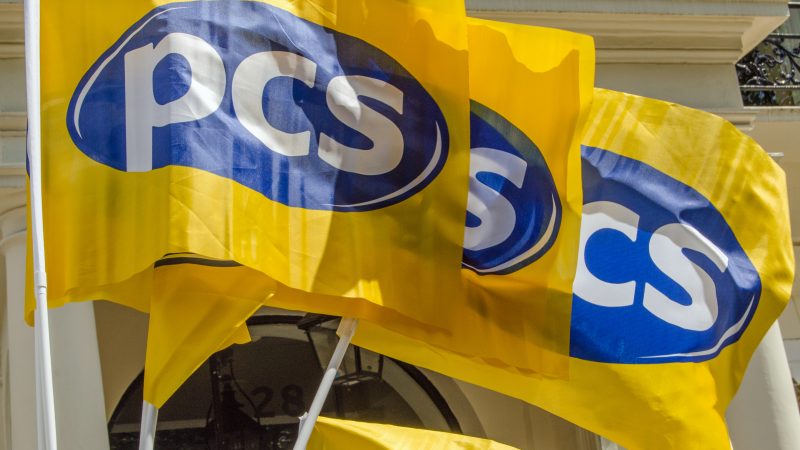
Last week, I was honoured to be elected to lead the Public and Commercial Services union (PCS) – which has around 190,000 members across the civil service and many government agencies – for the next five years.
Mark Serwotka, who led the union for 23 years, has been one of the most inspirational modern leaders in our movement, helping to turn PCS into the bold campaigning union that it is today.
This approach was visible during our successful national campaign in 2023, when we beat the government’s pay policy after combining huge national days of strike action with targeted actions across a number of employers. I was proud to be PCS president during this historic campaign. Our members showed how effective industrial action can be, winning an increased pay remit, a one-off £1,500 cost-of-living payment and guarantees on redundancy terms.
It also forced the Cabinet Office into a series of talks with PCS on pay and staffing. A key demand for us going forward is a collective bargaining agreement: one set of pay negotiations across the whole UK civil service, rather than each department having its own, as we currently have.
There has never been a more exciting time to lead PCS
It has been a long journey for me from rep to president to general secretary. I started my career at the then-Department of Health and Social Security in Yeovil in 1993. Most recently, I have been employed as an executive officer by the Department for Work and Pensions (DWP) in Newcastle.
But that journey is far from over. I am now determined to lead the fight as general secretary to keep driving up our members’ pay and deal with the cost-of-living crisis.
I am also very proud to be the first woman to lead PCS – or any of its predecessor unions for that matter. After all, approximately two-thirds of our membership are woman. And over the last 12 months of ballots and strikes, even more women have become active. A new generation of young and ethnic minority activists has also emerged. There has never been a more exciting time to lead PCS.
The government is attacking our members on many fronts
But times are tough for our members. We are battling a government that is attacking us on many fronts.
Among my own colleagues in the DWP, one in five are claiming in-work benefits. There are stories of members being unable to afford to switch on the heating or to feed their kids – and these are government employees. This is a damning indictment of the Tories and their policies of immiseration.
I will continue to fight, not only to improve pay and defend jobs and working conditions. I will also campaign to hold the government to account over pensions, redundancy terms, discrimination and to defend flexible and homeworking arrangements.
What’s more, our democratic right to strike is now also under attack, just as we prepare in the new year to mark the 40th anniversary of the ban on trade union membership at GCHQ.
Almost four decades after Margaret Thatcher enforced this ban and 14 members stood strong and were sacked, which provoked a historic campaign by workers that eventually overturned it, another Tory government is now taking a sledgehammer to trade union rights – this time through minimum service levels, which may restrict the right to strike for thousands of our members in the Home Office. But if they were serious about preventing strike action, they could start by immediately giving our members a fair pay rise.
We will hold Starmer’s feet to the fire
The same demands would be applied to the Labour Party if, as many expect, they lead the next government. As a union that is not affiliated to the party, we will hold Sir Keir Starmer’s feet to the fire.
However, we are not under any illusions that Starmer’s Labour Party will stand with working people. Just look at his party’s hostility to its own politicians joining picket lines or its plans to drop a commitment to abolishing Universal Credit and the current sanctions regime.
Starmer even went so far as to sing the praises of Maggie Thatcher, whose attacks against trade unionism included banning unions at GCHQ. This is not music to our ears.
Labour has said that, within 100 days in office, the party would repeal anti-union legislation. We welcome this commitment but believe that the devil will be in the detail. After all, the UK has some of the strictest and most restrictive anti-union laws in Europe. Overturning minimum service levels would and should only be a starting point.
No matter the party of government, PCS will fight for its members
Labour must give working people hope that their lives and our society can be better. And part of that must include being supportive of trade union rights.
But no matter what party is in charge of government, PCS will fight for its members, who have been underpaid and undervalued for far too long.
As an activist and rep at heart, I will work tirelessly on behalf of members to advance our aims. In addition to cost of living-proof pay rises, they desperately need pay restoration. And even though they are responsible for providing essential public services, they haven’t had a real-terms pay rise for more than 11 years. Enough is enough.




More from LabourList
‘Tackling poverty should be the legacy of Keir Starmer’s government’
‘The High Court judgment brings more uncertainty for the trans community’
‘There are good and bad businesses. Labour needs to be able to explain the difference’